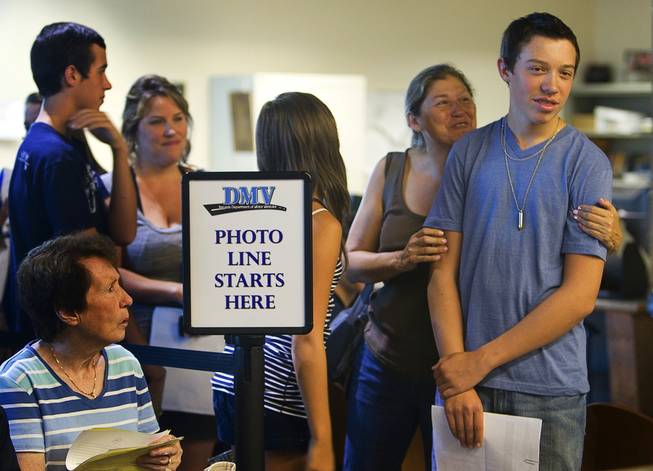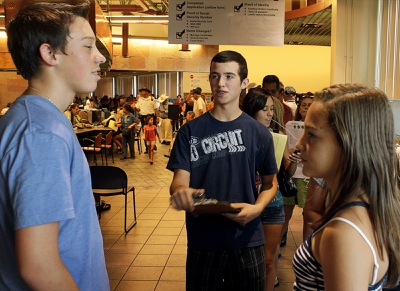
Shane Marshall, right, 16, a Foothill High School student, gets a hug from his aunt, Cris Marshall, while waiting in line at the Department of Motor Vehicles office in Henderson Monday, August 2, 2010. School officials on Wednesday will consider a policy that would prohibit students from getting driver’s licenses if they cut classes.
Tuesday, Aug. 3, 2010 | 2 a.m.
Reader poll
Sun Coverage
Beyond the Sun
Getting a driver’s license has long been a rite of adolescent passage. But in Nevada, as in other states, a driver’s license has had little or no connection with attending or graduating from high school.
That may be changing.
The Clark County School Board on Wednesday will discuss whether to push for a new state law that will link driving to school work.
If you don’t get good grades, you don’t drive.
Penalties could be meted out not just to the underachieving students but also to their parents.
The implications in Clark County are significant. About a third of the class of 2009 failed to graduate.
The proposal under consideration at Wednesday’s work session would require “proof of high school enrollment including demonstrated attendance and evidence of passing grades” to get — and keep — a license until the age of 18.
A license would be “an annual privilege subject to renewal.”
And if a student were to skip school three times or more and become what is known as a “habitual truant,” his parents would have to go to “Saturday intervention sessions” to learn how to be better parents. Parents could also lose recreational licenses, such as hunting and fishing.
At the Nevada Department of Motor Vehicles in Henderson on Monday, young drivers and potential drivers generally approved of the idea after reading the proposal.
Shane Marshall, 16, an incoming junior at Foothill High School in Henderson, said, “I’m totally for it.” Jordan Medina, 20, said, “If you go to school, you’re going to be more responsible.”
Kaitlynn Runyon, 17, an incoming senior at Basic High School in Henderson who is getting her driver’s license in two months, said her friends wouldn’t like the plan.
“The ones who are younger, I think, would completely disagree with it,” Runyon said. “Today’s generation is very lazy. So most children don’t go to school. Most children think they can just get passing grades so they can do whatever they want.”
And the “intervention sessions” for parents?
“Most children nowadays, they don’t come to school half the time and parents are allowing it,” Runyon said.
“A lot of my friends’ parents allow them to miss school,” she said. “Your parents are who you are supposed to look up to. In today’s generation, you don’t really see a lot of that.”
Older adults at the DMV seemed puzzled by the parental penalties.
One woman seemed outraged.

Foothill High School students Shane Marshall, left, and Tyler Hauger, chat as they wait in a line at the Department of Motor Vehicles office in Henderson Monday, August 2, 2010. School officials on Wednesday will consider a policy that would prohibit students from getting driver's licenses if they cut classes.
Cris Marshall, a 911 emergency call-taker and the aunt of Shane Marshall, said, “What? Say that again? That, I do not agree with. That part I do not believe is fair.”
Marshall, 49, said that if a student is habitually truant, it might be a job for Child Protective Services or some other agency. “Something is going on in their home life besides ‘I don’t want to go to school.’ ”
Habitual truancy in the School District is defined as three or more unexcused absences during the 180-day school year.
Joyce Haldeman, the district official whose staff drafted the plan, anticipated that the proposal would be “controversial,” but that she wanted it to be.
“Schools can’t do it by themselves, so we want to open a dialogue on valuing children going to school,” she said. “We want to make this a priority.”
Haldeman, the district’s associate superintendent for community and government relations, brings a parent’s perspective to her job. She has five grown children who attended public schools.
There are “uncomfortable elements” in the proposal, Haldeman said, such as Saturday better-parenting classes and the revocation of, as the proposal terms it, “certain state recreational licenses.”
She noted that in the request for the bill, the district is only proposing the idea, not offering final statutory language.
Haldeman said she wasn’t aware of any other state with a law that contains the elements proposed here.
The proposal set for review by the board members is available in greater detail on the district’s website.
The public can comment at the board’s 9 a.m. meeting Wednesday.


Join the Discussion:
Check this out for a full explanation of our conversion to the LiveFyre commenting system and instructions on how to sign up for an account.
Full comments policy